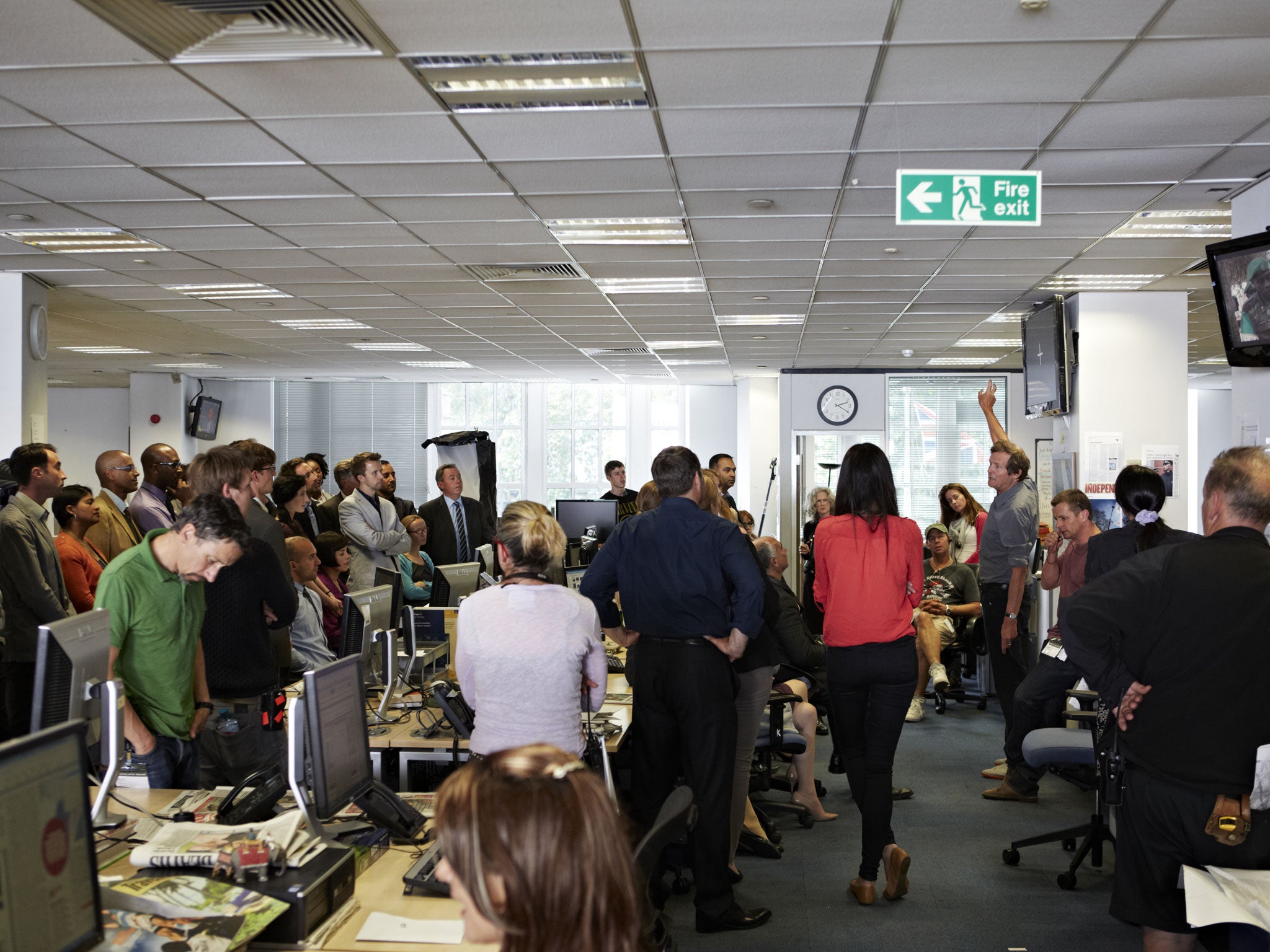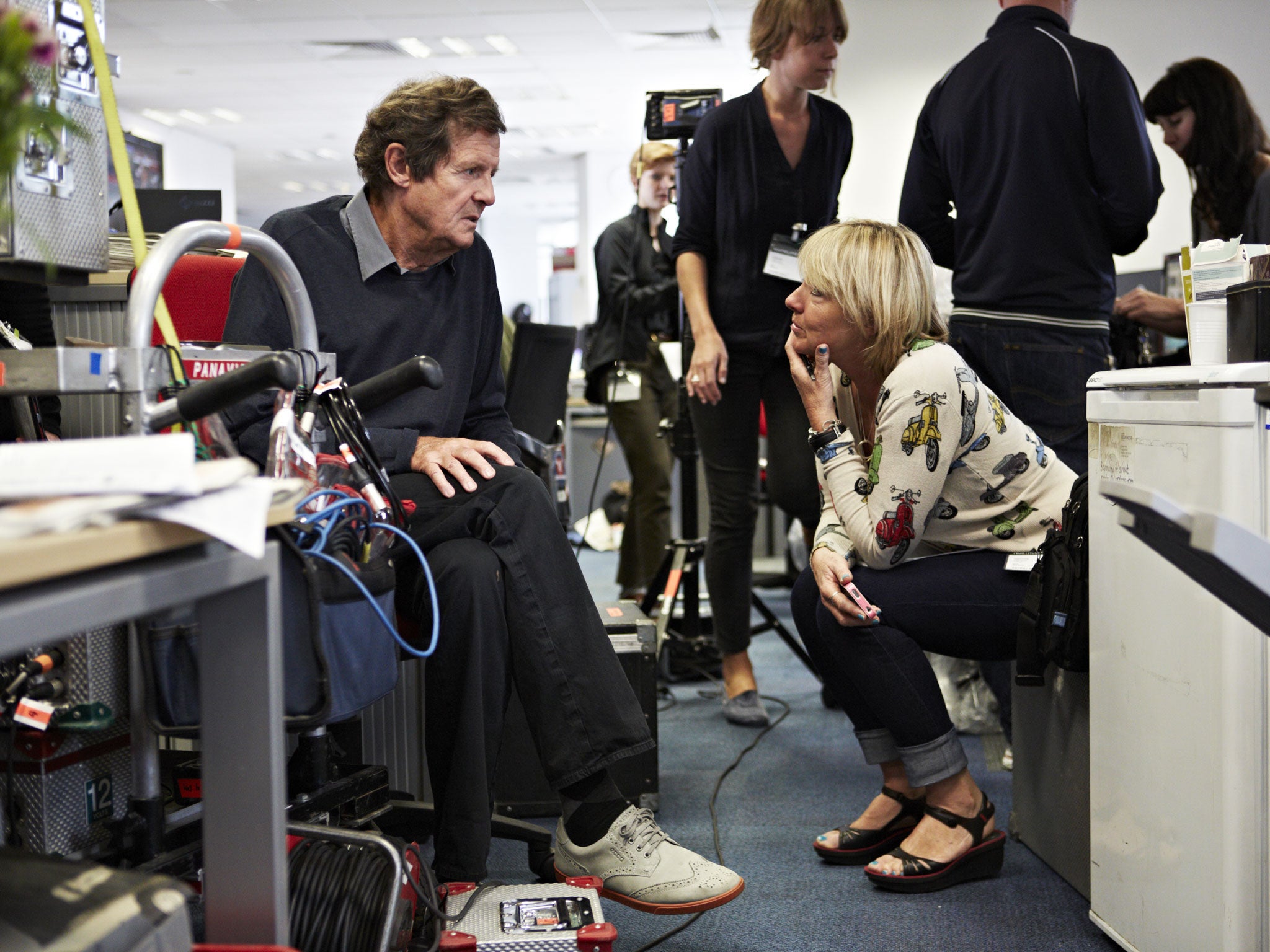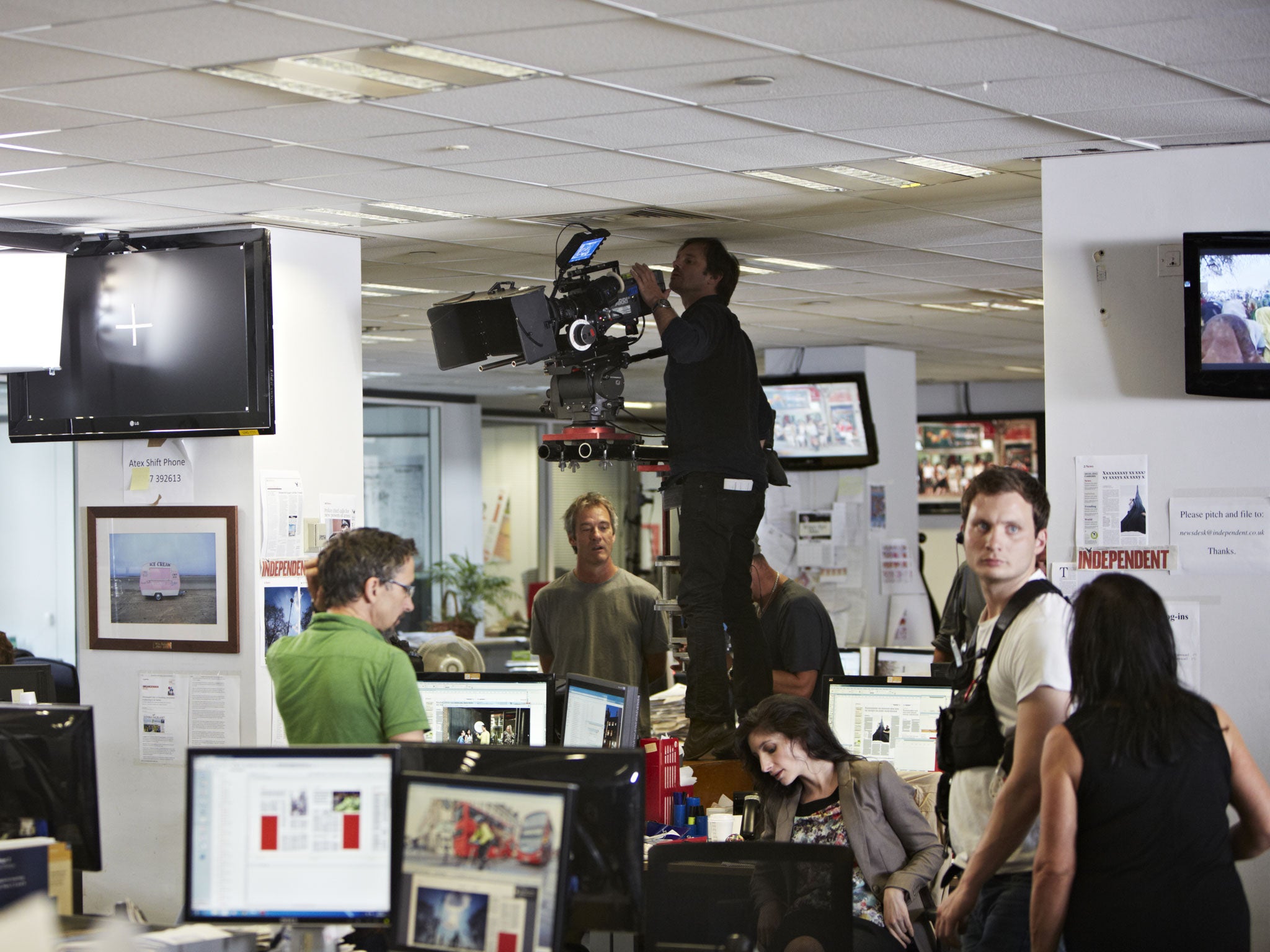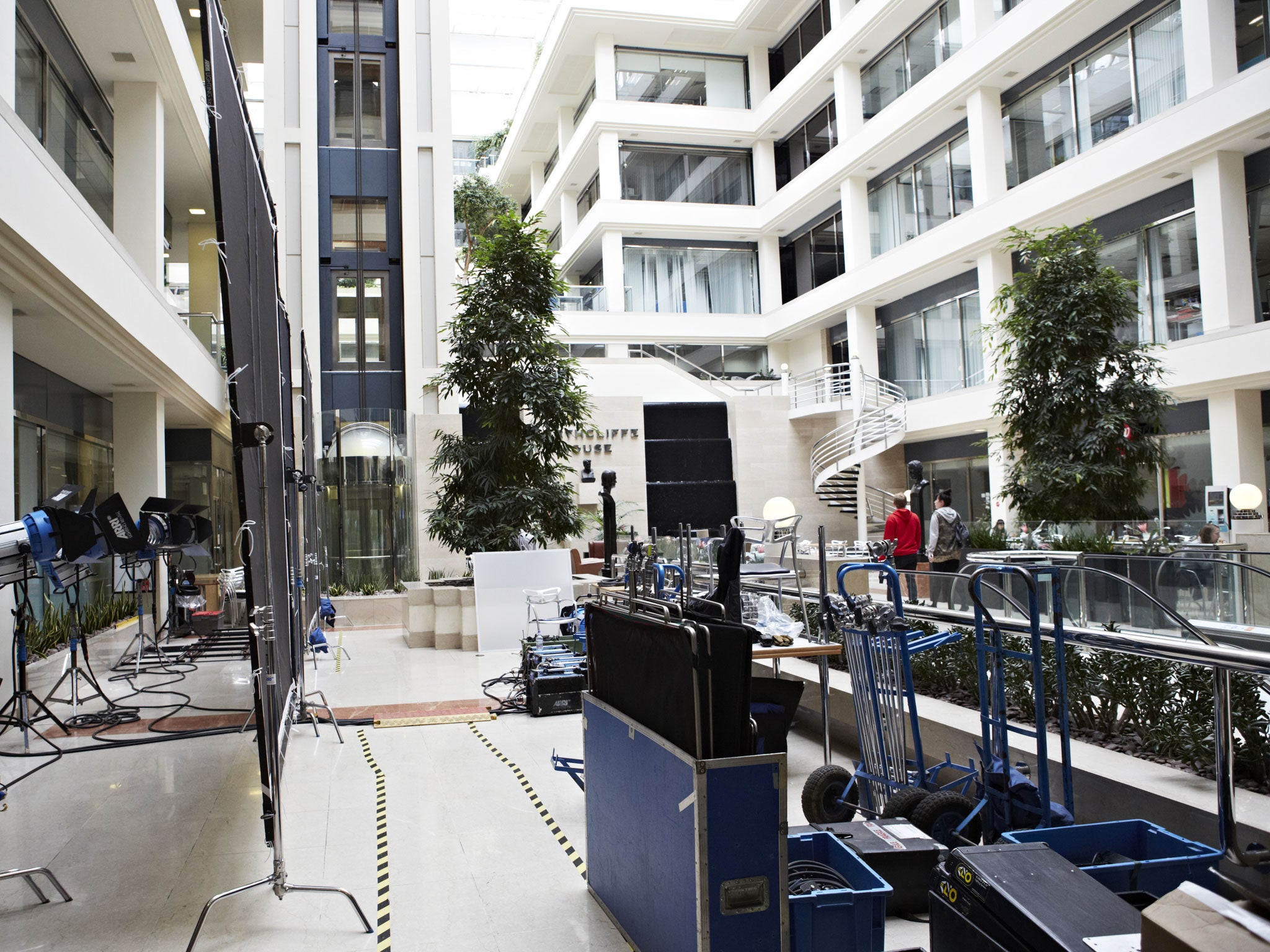Never mind Bill Nighy, the real star of Worricker is The Independent
Our newsroom stars in David Hare’s final Worricker TV drama. The award-winning playwright reveals why he chose it – and us

The normally spartan office occupied by the editor of The Independent has undergone a radical make-over. Tissues and Tesco dog-biscuits are strewn across the floor. Copies of The Field and Country Life adorn the shelves next to various canine-show rosettes. A framed picture of two lovable Labradors takes pride of place on the desk. Is our esteemed, Tooting-raised editor Amol Rajan now running with a very different set? The transformation is even more marked when the editor makes a grand arrival.
Instead of our cricket-loving leader, the imperious, award-winning actress Olivia Williams sweeps in and takes her seat, accompanied by those yapping Labradors.
A sound boom hovers over Williams, spotlights are moved into position and a hush descends over the boisterous newsroom outside.
Then the orchestrator of this scene, the distinguished playwright and director Sir David Hare utters those immortal words: “Lights, turning, rolling… action.”
For one blazing Sunday in June, The Independent has been transformed into a movie set and the editor’s office hasn’t witnessed such drama since the day Rebekah Brooks and James Murdoch stormed in to berate a previous incumbent.
Sir David is here to film scenes for Salting the Battlefield, the final instalment of the Worricker trilogy of spy thrillers, starring Bill Nighy as a world-weary intelligence officer, which he has written and directed.

The Independent plays a central role in the finale, to be screened on BBC2 at the end of this month, which follows the paper’s campaigning editor as she uncovers shocking evidence of a corruption scandal which extends to the very heart of Downing Street.
A believer in cinematic naturalism, Hare determined to shoot the newspaper scenes during a working day in the office itself.
“Attempts to create newspaper offices are absolutely doomed,” he says.
“A real paper has got so much life to it and there’s no way you can recreate that. The Independent newsroom still has a bit of the romance about it that other newspapers lack.”

Watch Apple TV+ free for 7 day
New subscribers only. £9.99/mo. after free trial. Plan auto-renews until cancelled.
ADVERTISEMENT. If you sign up to this service we will earn commission. This revenue helps to fund journalism across The Independent.

Watch Apple TV+ free for 7 day
New subscribers only. £9.99/mo. after free trial. Plan auto-renews until cancelled.
ADVERTISEMENT. If you sign up to this service we will earn commission. This revenue helps to fund journalism across The Independent.
For the journalists, sub-editors and production mangers working this Sunday shift, that romance is tinged with the task of getting The Independent and i papers out on deadline, while negotiating an office teeming with runners, camera operators, script editors and dog wranglers – and most disturbingly, extras acting as their doubles.
The hulking catering truck parked outside Derry Street indicates that the film, produced by Carnival, the company behind Downton Abbey, is a big deal.
For some Independent scribes, the filming is an overdue opportunity to make their mark in Hollywood, or at least get their heads in shot.
But, tragically, the real journalists are required to relocate to different desks at the rear of the newsroom whilst their seats are taken by a team of immaculately dressed, perfectly gender- and ethnically-balanced – and frankly, better-looking – extras.
Were the Independent hacks too much of a box-office turn-off? “I don’t think they’re better looking, they’re just more obedient than you lot,” said the director, of the stand-ins.

The shooting schedule creates challenges for the journalists. The office televisions, typically tuned to Sky News for breaking news, instead screen a specially-prepared loop of a fictional news channel reporting the story at the heart of the film.
Tom Howard, supervising location manager, said: “We have to be very careful about clocks, they have to be removed. Video footage on screens has to be cleared.
“We dressed the editor’s office to reflect Belinda’s character and we made a huge branded Independent sign to reinforce where we are visually. You get to keep that. Some people are surprised we’re here. Hopefully it won’t upset their day.”
The newsroom hubbub rises when sub-editors arrive in the afternoon and take over the bank of desks next to where Williams’s editor, Belinda, is filming a scene in which she discusses the source of a scoop with an ambitious young reporter, Allegra.
“We were tipped off that a lot of Monday’s paper is prepared in advance so it wouldn’t be the most hectic day in a newspaper office,” Hare said. “We were quite impressed about how quickly everybody went about their business. It is quieter than it used to be. People don’t scream, ‘hold the front page’, anymore.”
Hare’s 1985 play Pravda employed a Rupert Murdoch-style mogul to satirise newspaper journalism. Salting the Battlefield, which follows Page Eight, aired in 2011, and its sequel Turks & Caicos, which stars Winona Ryder and was screened yesterday, is a post-Leveson plea for the importance of investigative journalism.
Sir David said: “I wanted it to be set at a newspaper [office] in which the people must be working there for the right reasons, not that over-weening power we associated with the press in the Eighties and Nineties.
“It’s about a heroic, sort of old-fashioned, romantic view of newspapers because they have been having a hard time and they still do a job. At the moment when people appear to have lost all hope in their democratic institutions then clearly the press becomes more, rather than less, important.”
Hare’s country squire-ess editor has the freedom to be “independent” by virtue of her wealth and background.
“She’s totally fictional,” the writer of Plenty and The Absence of War explains. “As far as I know there aren’t any posh, toff women editors at the moment, are there? I liked the idea of a newspaper editor who didn’t deal in peddling influence at all.”

The crew, somewhat jet-lagged after 18 days shooting in the Bahamas, suddenly step up the pace. Producer Celia Duval explains: “It’s an 8pm finish or we’d have to pay overtime. We are very tight on budgets so we must finish at eight. Then the art department will take out everything we’ve put in.”
Belinda gathers her fictional journalistic team in front of the television screens to hear Alec Beasley, the unscrupulous prime minister played by Ralph Fiennes, make a statement.
Champagne corks are popped as The Independent celebrates a breakthrough in its investigation. Sir David asks the cork-popping scene to be re-shot several times, to the apparent envy of the real journalists.
On the stroke of the 8pm, it’s a wrap. “The strike crew is ready to remove the set dressing and have the equipment wrapped in 30 minutes,” said Howard. “Nobody on Monday will be any the wiser.”
The movie circus moves on as quickly as it arrived but perhaps the paper’s day in the screen spotlight has left a legacy.
A move upstairs means the editor’s office is now the main studio for the company’s new London Live television station – and those Independent journalists cast into the shadows will now be given their chance to appear on camera, without any scene-stealing extras.
‘Salting the Battlefield’ will be broadcast on Thursday at 9pm on BBC2
Join our commenting forum
Join thought-provoking conversations, follow other Independent readers and see their replies
Comments
Bookmark popover
Removed from bookmarks